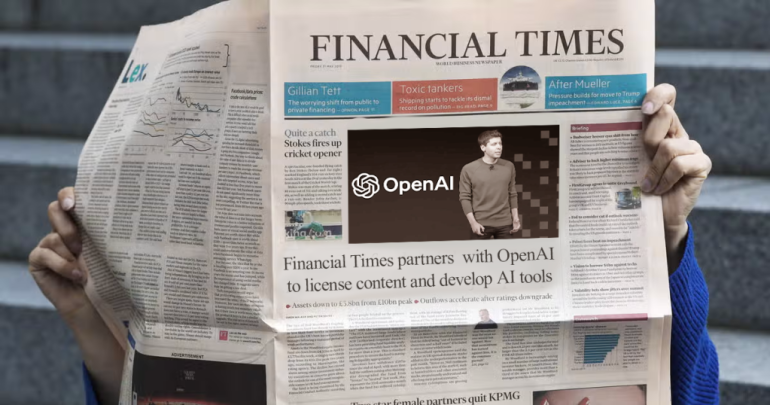- OpenAI collaborates with Financial Times, integrating FT content to enhance AI systems’ training.
- Financial compensation is undisclosed, reflecting AI companies’ recognition of publishers’ content value.
- ChatGPT users to benefit from enriched responses with summaries, quotes, and article links from FT.
- Emphasis on transparency, attribution, and quality journalism in AI development.
- Legal disputes over copyright infringement amidst AI advancements.
- The collaboration underscores the importance of reliable journalism in shaping AI’s future.
Main AI News:
In a significant move signaling the fusion of cutting-edge technology and reputable journalism, OpenAI has entered into a partnership with the esteemed Financial Times. This collaboration allows OpenAI to leverage the rich content of the FT to enhance the training of its artificial intelligence systems.
Under this landmark agreement, undisclosed financial compensation will flow to the Financial Times, marking a trend among AI companies recognizing the value of publishers’ content. John Ridding, CEO of the FT Group, emphasized the importance of fair compensation, stating, “It’s right that AI companies pay publishers for their material.“
This collaboration not only benefits the involved parties but also holds promise for users of AI technologies. By incorporating summaries, quotes, and links to FT articles into responses, ChatGPT users can expect enriched and reliable outputs, aligning with OpenAI’s commitment to transparency and quality.
Brad Lightcap, Chief Operating Officer at OpenAI, stressed the significance of upholding quality journalism in AI development. “Representing quality journalism is paramount as these products evolve,” Lightcap remarked, highlighting the company’s dedication to responsible innovation.
The alliance between OpenAI and the Financial Times comes amid legal disputes in the AI sphere, including lawsuits from prominent authors and entities alleging copyright infringement. Despite these challenges, the collaboration signifies a pivotal step towards responsible AI development and ethical content usage.
This strategic partnership not only augments the capabilities of AI systems but also underscores the pivotal role of reliable journalism in shaping the future of artificial intelligence. As the AI landscape continues to evolve, collaborations like these are poised to redefine the boundaries of innovation while upholding journalistic integrity and intellectual property rights.
Conclusion:
The collaboration between OpenAI and the Financial Times signifies a strategic alignment between advanced AI development and quality journalism. By incorporating reputable content into AI training, this partnership not only enhances the capabilities of AI systems but also emphasizes the importance of ethical content usage and fair compensation for publishers. This collaboration sets a precedent for responsible AI innovation and underscores the pivotal role of reliable journalism in shaping the future of artificial intelligence.

